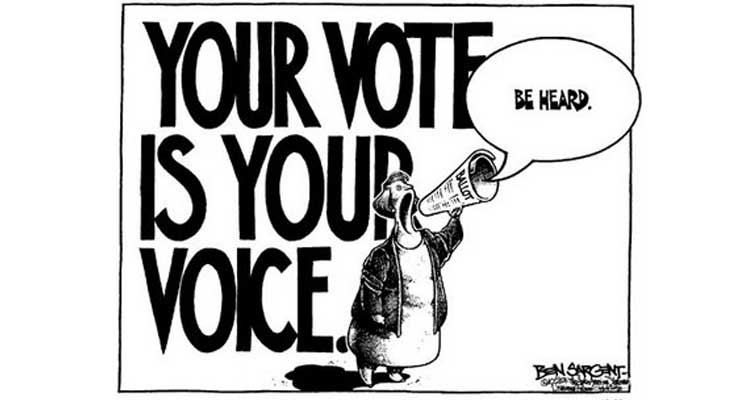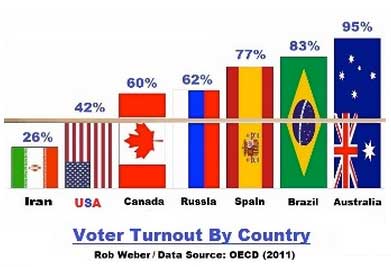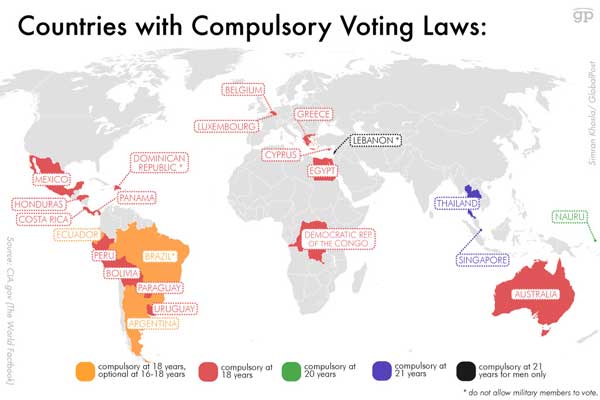
The freedom to vote is largely boasted within America yet induces results inconsistent with that of a transparent democracy.
Voting is a fundamental, but forsaken civil liberty. It is a privilege, a responsibility and a basic human right. It grants us the opportunity to voice and exercise our entitlements as citizens of a democracy. The power to transform the nation rests in our hands, yet it is no longer grasped with the sense of eagerness that it once was.
Women faced abuse and criminalisation to be able to vote. African Americans faced murder and violence. Indigenous Australians faced hostility and ridicule. Minority groups across the globe risked their lives for universal suffrage. But after such a long, strenuous battle, so many citizens of America have become inactive and idle in their responses to elections. Should the existing freedom to vote consequently become a mandatory obligation nation-wide?
This is largely dependent on your concept of the political legitimacy of a government. Australia, for example, is one of the few democratic governments in the world legally enforcing the voting of all citizens. The law – active since 1912 – has resulted in Australia having one of the most politically engaged societies in the world. Perhaps this is a repercussion of consequential fines for the politically disengaged; however, would a $20 fine really coerce you into voting once every few years? I would be inclined to think not.
 America, on the other hand, prides itself and operates on a free choice mentality. To the surprise of many Americans, in the last national election in 2012, voting participation in America ranked 31st out of 34 other largely developed, democratic societies. This seems like a pitiful effort for a nation constructed upon a ‘government of the people, by the people, for the people’. If only 54% of the entire American population are deciding on the president, can America justifiably claim it operates within a democratic political system? Is the government truly ‘by the people’ and ‘for the people’?
America, on the other hand, prides itself and operates on a free choice mentality. To the surprise of many Americans, in the last national election in 2012, voting participation in America ranked 31st out of 34 other largely developed, democratic societies. This seems like a pitiful effort for a nation constructed upon a ‘government of the people, by the people, for the people’. If only 54% of the entire American population are deciding on the president, can America justifiably claim it operates within a democratic political system? Is the government truly ‘by the people’ and ‘for the people’?
You would think a government claiming to represent ‘the people’ would unequivocally aspire to include the opinions, values and needs of every citizen, despite differing socioeconomic backgrounds, ethnicities and genders. But with majority of votes coming from individuals with higher education degrees and household earnings over $150,000, the intentions of the government have indeed become questionable. With the highly educated and wealthy determining majority of the votes, the voices of the disadvantaged and uneducated are silenced.
America’s dignified personal freedom to vote remains inherently intact, but the ‘choice’ to vote that is simultaneously taken away from the poor is unheard of. The polling location ‘downtown’ in Lafayette, Louisiana, for example, was shut down due to economical cuts and moved to the more central, wealthy side of town. With polling locations out of reach for low socioeconomic and minority communities, voices of American citizens are silenced. The consequences of these ‘economic cuts’ are stipulating greater divides between the poor and the privileged and giving preference to the opinions and needs of citizens living ‘The American Dream’.
Whilst this is undoubtedly beneficial for middle and upper class populations, does it not imply a specific intention of the government? When will the voices of the working class be heard? Or will politicians with large sums of money repeatedly silence them with payouts? The freedom to vote heightens the manipulation of disadvantaged peoples by bribing them with money and feeding on their weaknesses. Silencing those who restrain the wealthy is becoming a growing threat within America, and optional voting is certainly not contributing to the resolution of this issue. The supposed ‘American Dream’ that has for decades been sought after by the thousands, is beginning to look rather inconceivable.
Compulsory voting has the capacity to develop a broad and egalitarian approach to society. So, would it improve our quality of life? Well, Australia manages to maintain a relatively equal spread of wealth and income, with free health care being provided for citizens. Brazil, one of several other countries enforcing compulsory voting, has managed to acquire free higher education.
Has America become too preoccupied with its nationalism, statehood and the benefits of freedoms to recognise the consequences it may entail? Has America become too similar to that of a dictatorship that it no longer has the option of converting to an egalitarian lifestyle? With its current dire state, this could possibly be the case.
Striving for equality and individual freedoms are largely shared values of every democracy worldwide. Nonetheless, as a citizen of a nation, you become part of the collective. You are a collective individual. When do you draw a boundary between your individual freedom, and the benefits for the larger society as a whole? Or has that become non-existent?
Every nation has their weaknesses, downfalls, and strengths; however, there comes a point when the strengths of a nation can no longer supersede the voices of citizens, whether they be privileged or deprived.
After all, American stands for ‘liberty and justice for all’.

LINKS:
https://www.aec.gov.au/voting/Compulsory_Voting.htm
https://www.pewresearch.org/fact-tank/2015/05/06/u-s-voter-turnout-trails-most-developed-countries/
https://www.census.gov/content/dam/Census/library/publications/2015/demo/p20-577.pdf
Leave a Reply